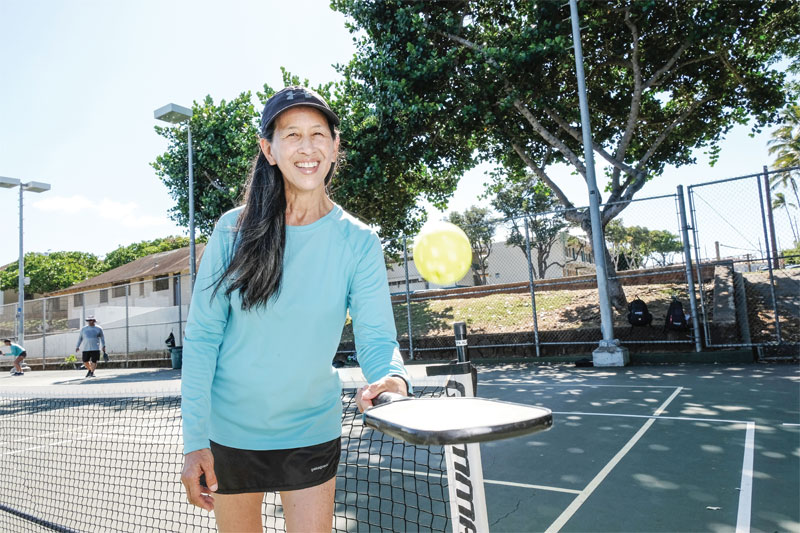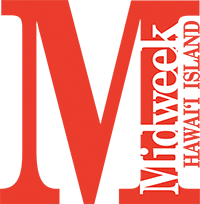Ready, Set… Pickleball!

Photo by Lawrence Tabudlo
The O‘ahu Pickleball Association and its founder and president Donna Ching are stepping up their game by promoting the country’s fastest-growing sport.
Even if you’re not a pickleball player, the odds are you know someone who is. According to the Sports & Fitness Industry Association’s 2024 Topline Participation Report, pickleball remains the fastest-growing sport in America for the third year in a row with an estimated 13 million players.
One of the state’s most dedicated players is Donna Ching. She is the founder and president of the O‘ahu Pickleball Association, and it’s her mission to expand and promote this paddle (or racket) sport that dates back nearly 60 years, to when three men in Bainbridge Island, Washington, began toying around with ping-pong paddles and a perforated plastic ball on a badminton court.
Ching, who grew up in the heart of Silicon Valley in California with her parents and five siblings, always had a love for sports. She participated in track and field and volleyball, but tennis consumed most of her childhood and young adult life, and it’s a game she’s continued to play for more than four decades.
Ironically, it was while participating in a United States Tennis Association national championship in November 2016 in Surprise, Arizona, that Ching discovered a new passion — pickleball.
“I fell in love with the sport. I just love how I connected with the ball and the paddle, the bounce,” she reminisces. “I could not stop thinking about it even after we were (done) playing. I really didn’t want to leave the courts.”
Upon returning to Hawai‘i, Ching began to look for a place where she and husband Kevin could play the sport. Even though she knew that people were playing pickleball around O‘ahu, Ching had trouble finding these games. She recalls wondering, “Why is this a kept secret? Everybody should be learning how to play this sport.”
The Chings eventually partnered with a few of their friends in what they called “Learn to Play Pickleball in an Hour” sessions. That team would travel around the island looking for volleyball and tennis courts to play on, laying down painter’s tape to mark the lines (pickleball is played on a much smaller court) and bringing the necessary equipment to teach newbies how to play. The group also began using the social media platform Meetup to organize and schedule games.
The group of 5,000-plus members is still considered the largest Meetup group in Hawai‘i.
“We said, ‘However many times that we could do this (for) however many people, for free, let’s do it because we felt it was really important and because we really enjoyed the sport,” Ching says.
“It’s not to say that we brought pickleball to Hawai‘i,” she clarifies. “It was already here … we just helped grow it and promote it and put more organization behind it.”
OPA officially formed in April 2017. The organization — which is run by a volunteer board of directors — offers lessons, hosts tournaments, puts on demonstrations and exhibitions, and provides the public with general information about pickleball.
When the pandemic hit, OPA considered dialing back on its activities. However, it soon realized it needed to go in the opposite direction because interest in the sport was growing, according to Ching.
“COVID did not slow pickleball down in any way, it actually helped pickleball,” she explains. “People were playing pickleball on the streets, in their parking garages, in their driveways, on their rooftops, wherever they could get their pickleball in. People were learning pickleball, paddles were being sent in the mail from one family to another. Kūpuna were teaching pickleball to their kids. It was just a really very interesting time.
“We thought, ‘We really need to ramp up here because people have been asking for lessons and wanting to play both recreationally as well as competitively,’” Ching continues. “So, that’s when I decided to put together the leagues, both offering those who were coming into pickleball and to those who were further ahead in their skills.”
The association currently offers two leagues: Po‘aono (for players age 14 and up and age 18 and up) and Lāpule (age 50 and up). While it continues to work toward establishing an official Juniors Pickleball Program for children age 8 and up, the organization does offer lessons to keiki and hosts Learn to Play Pickleball clinics at schools.
“You don’t have to be a superstar or an athlete to play this sport,” says Ching, adding that pickleball is for those of all abilities and all ages.
“I think what’s so enjoyable about the sport is that everyday people who just started playing the pickleball sport are just so willing to teach others,” she adds. “In that way, it’s so gratifying because I haven’t seen that in other sports.”
Perhaps another reason why the sport has grown at such an accelerated pace is the many health benefits it provides.
As an approved Blue Zone Hawai‘i Project, OPA helps pickleball players adopt and live a healthier lifestyle. It lists a number of benefits, including improved balance, hand-eye coordination and flexibility, and a stronger heart as the sport is a great form of cardiovascular and aerobic exercise.
But the game also has mental and social advantages. OPA notes that playing pickleball releases endorphins, which can lessen anxiety, depression and stress. It’s also a great way to connect with others on a social level.
“I think the biggest reason why people stay in pickleball is the friendships that they make — so quickly as well,” says Ching. “It just feels good to know that there are other people that people can reach out to. They go up to a park site and they say, ‘Do you want to play?’ and usually the pickleball player will most times say yes.”
As more and more people were eager to become “pickleheads,” OPA recognized the need to establish more dedicated pickleball courts — specifically designated for the game and with permanent nets — across the island. The organization continues to work closely with the city Department of Parks and Recreation to advocate for more of these courts and currently has a survey on change.org requesting additional courts dedicated to pickleball in urban Honolulu, which includes Kaka‘ako, Ala Moana and Punchbowl. OPA recently persuaded the department to allow pickleball in the tennis wall practice area at Ala Moana Regional Park.
And that’s not all pickleball fanatics have to look forward to. On Nov. 1-3, the Pickleball Management Group, with OPA’s support, will celebrate Hawai‘i Convention Center’s new pickleball courts. Players will be able to choose from a variety of activities, including open-play, clinics, round-robins and more.
OPA also wants to make sure it’s doing its part to give back to the community. It organizes community service projects at Mother Waldron Park in Kaka‘ako as part of the city’s Adopt-A-Park program. Pickleball pro Keven Wong, who is also an instructor with OPA, has helped to organize a couple of cleanups at the park with fellow association members. Earlier this year, the organization also collaborated with Pālolo Valley District Park’s foundation to bring pickleball to both keiki and adults by hosting a free learn-to-play workshops.
These days, Ching isn’t able to play pickleball as much as she used to because she spends much of her time caring for her mom in California. But when she is at home in the islands, you’ll most likely find her on a court playing the game she loves.
Her advice to those contemplating joining pickleball?
“Just have fun. Just be a kid,” she says. “You will just really enjoy the sport. If you’re open to just having fun, I would say you’re already on track because if you want to laugh, this is the sport to be a part of. It really is.”

